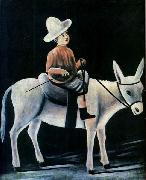Großhandels China Öl Gemälde & Rahmt Ein |
|||||||||||

|
|||||||||||
|
|
|
||||||||||||||
|
Niko Pirosmani
Pirosmani was born in the Georgian village of Mirzaani to a peasant family in the Kakheti province. His family owned a small vineyard. He was later orphaned and put in the care of his two elder sisters. He move with them to Tbilisi in 1870. In 1872 he worked as a servant for wealthy families and learned to read and write Russian and Georgian. In 1876 he returned to Mirzaani and worked as a herdsman. Pirosmani gradually taught himself to paint. One of his specialties was painting directly into black oilcloth. In 1882 he opened a workshop in Tbilisi which was unsuccessful. In 1890 he worked as a railroad conductor, and in 1895 worked creating signboards. In 1893 he co-founded a dairy farm in Tbilisi which he left in 1901. Throughout his life Pirosmani, who was always poor, was willing to take up ordinary jobs including housepainting and whitewashing buildings. Although his paintings had some local popularity (about 200 survive) his relationship with professional artists remained uneasy; making a living was always more important to him than abstract aesthetics. |
||||||||||||||
|
|
||||||||||||||
|
||||||||||||||
|
|
||||||||||||||
| Niko Pirosmani
Pirosmani was born in the Georgian village of Mirzaani to a peasant family in the Kakheti province. His family owned a small vineyard. He was later orphaned and put in the care of his two elder sisters. He move with them to Tbilisi in 1870. In 1872 he worked as a servant for wealthy families and learned to read and write Russian and Georgian. In 1876 he returned to Mirzaani and worked as a herdsman. Pirosmani gradually taught himself to paint. One of his specialties was painting directly into black oilcloth. In 1882 he opened a workshop in Tbilisi which was unsuccessful. In 1890 he worked as a railroad conductor, and in 1895 worked creating signboards. In 1893 he co-founded a dairy farm in Tbilisi which he left in 1901. Throughout his life Pirosmani, who was always poor, was willing to take up ordinary jobs including housepainting and whitewashing buildings. Although his paintings had some local popularity (about 200 survive) his relationship with professional artists remained uneasy; making a living was always more important to him than abstract aesthetics. 80 ?? 99 cm (31.50 ?? 38.98 in)Year 1916 |
||||||||||||||
|
Related Paintings to Niko Pirosmani :. |
||||||||||||||
|
|
||||||||||||||
|
|
||||||||||||||
|
KONTAKTIEREN Sie UNS |







